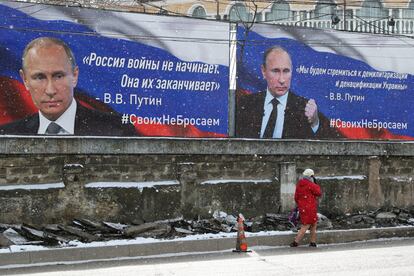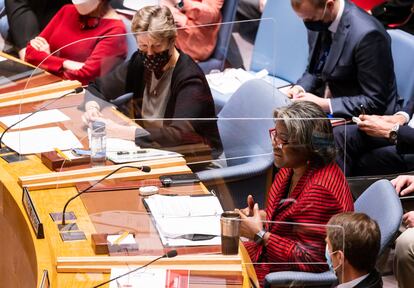Vladimir Putin gets ready to intensify his war on Ukraine
Western nations fear that Moscow will ramp up the offensive so that the president can sell his ‘special operation’ as a victory back home

The images of pregnant women injured by aerial attacks in Ukraine, where civilians are increasingly struggling with food and heating shortages, have left the world in shock. Russian bombs have now reached as far west as Lutsk, a city located 54 miles (87km) from Poland. Two weeks after it began, the war is getting closer to the European Union. Yet allied countries’ intelligence services all agree that the Russian campaign has advanced more slowly than the Kremlin had figured.
The United States had warned that Kyiv could fall in just two or three days, yet Russian troops have yet to fully encircle it. But there is no margin for relief, because if everyone agrees on anything else, it’s this: that Russian President Vladimir Putin is going to intensify the violence.
CIA director William Burns on Tuesday warned about an “ugly next few weeks” ahead, speaking at a hearing in Congress. He described Putin as “angry and frustrated” and likely to try to quash the Ukrainian army with no regard for civilian victims. US intelligence services believe that the Russian leader underestimated the capacity and boldness of the Ukrainian resistance, a fact that has slowed down the Russian advance. But Washington is convinced that Putin will carry on with the invasion until he can portray it to the Russian people as a victory. “He was confident he has modernized his military and they were capable of a quick, decisive victory at minimal cost,” added Burns in Congress. “He has been proven wrong.”

Despite the deaths, the sanctions and the country’s progressive isolation, Moscow will not let up. On the contrary, it will most likely intensify the offensive, according to US intelligence. Russian troops have already cut off several cities’ supply of food, water, heating and medicines. Without these essential items, Kyiv could find itself in a desperate situation in a matter of 10 to 15 days. And the Kremlin on Friday announced it had recruited 16,000 soldiers from Syria and other parts of the Middle East to fight in Ukraine.
Ukrainian officials say they have inflicted significant damage on Russian troops, captured a lot of war equipment and reached a point where Moscow had not been expecting to find itself. But sources in the Ukrainian government also said that Russia, while dealing with serious logistical and communications issues, is repositioning and regrouping its troops. These sources are afraid that Russia will deploy its entire arsenal of aerial attacks, which could cause crippling damage. That is why Ukrainian President Volodymir Zelenskiy wants NATO to activate a no-fly zone in Ukraine. Russia’s air power and Ukraine’s anti-aerial defenses cannot be compared, although Kyiv has prevented Russian attacks and mounted counter-attacks of its own with Turkish-made drones and Western anti-tank weapons.
Regrouping
Faced with resistance from the Ukrainian army and civil society, Moscow has adopted the strategy of attacking urban and residential areas. Kyiv believes the Russian army will increase the assault on key cities in the coming days in order to strike fear into the civilian population, subjugate it, negotiate an evacuation and launch a tough offensive to take the cities. Ukrainian defense sources said Moscow has recruited Syrian combatants with training in urban combat to help invade cities. These sources also think it is likely that Belarus will start actively participating in the invasion.
The Ukrainian government is further concerned about the possibility of an attack with chemical or biological weapons. The Kremlin has been accusing the US for days of developing biological weapons in Ukrainian labs, and Kyiv thinks this is a pretext for launching a chemical or biological attack and blaming Ukraine for it. Washington thinks that Moscow is setting the scene for a false flag attack that it would blame on the allies. The issue came up on Friday at the United Nations Security Council, whose rotating presidency is currently held by none other than Russia. At a meeting on biological weapons called by Moscow, US Ambassador Linda Thomas-Greenfield said that the Kremlin is using the Council “to legitimize and justify” Putin’s actions.
For the US government, however, the Kremlin’s recent decision to raise the nuclear alert level is, for now, little more than posturing; intelligence agents have not detected any changes in the position of Russia’s nuclear forces.
“Maximalist” strategy or partial victory
The question is whether Moscow will adopt a “maximalist” strategy aiming at complete control of the territory, or whether it will settle for a few key enclaves of special political significance or symbolic meaning. The CIA cannot see a way for Putin to effectively take Kyiv and replace Zelenskiy with a pro-Russian government. Like the director of National Intelligence Avril Haines said, what Putin is ready to accept as a victory may change with time, given the significant cost the war is having for Russia.
The US estimates that the Russian army may have lost between 2,000 and 4,000 soldiers, a wide bracket that is in any case difficult to verify. The use of inexperienced young conscripts instead of professional soldiers has been one of the thorniest issues for the Russians. Defense Ministry spokesman Igor Konashenkov admitted as much on Wednesday. “Unfortunately, some facts have come to light about the presence of conscript servicemen among the Russian armed forces conducting the special military operation on Ukrainian territory,” he said.

Just one day earlier, on March 8, Putin had denied the participation of young draftees, and insisted that only professional soldiers were being sent to Ukraine. But a local newspaper, Nóvaya Gazeta, published a story in which the president of the Committee of Mothers of Soldiers, Andréi Kurochkin, stated that several young men had been forced to sign temporary contracts under pressure. Under Russian law, young men doing their military service must sign a contract in order to take part in combat. The Defense Ministry said that most of those conscripts have been sent back to Russian territory, but Konashenkov did not provide a clear figure of how many young recruits had participated illegally in the fighting. He did admit that a unit in charge of logistical support was attacked by Ukrainian saboteurs who captured several Russian soldiers, including conscripts, and that they were working towards their release.
Russia’s armed forces offered their first and last official death toll on March 2, a week after launching the offensive. Before that, on February 27, they had confirmed losses but failed to provide a number. Officially, the Russian casualty tally is stuck at 498 dead and 1,597 injured for the last nine days.
This is in contrast with their detailed daily reports on destroyed targets in Ukraine. The Russian Defense Ministry claims it has destroyed 2,396 enemy objects since the beginning of the “special operation for the defense of the republics of Donetsk and Luhansk.” On the second day of the invasion, the ministry also said it had achieved one of its main strategic goals: unblocking the water flow from the Dnipro river to Crimea; this flow had been cut off by Kyiv following the Russian annexation of the peninsula in 2014.
A week after ordering the offensive, Putin told his Security Council that everything was going according to plan. And his defense minister, Sergei Shoigu, echoed his words on Friday.
Tu suscripción se está usando en otro dispositivo
¿Quieres añadir otro usuario a tu suscripción?
Si continúas leyendo en este dispositivo, no se podrá leer en el otro.
FlechaTu suscripción se está usando en otro dispositivo y solo puedes acceder a EL PAÍS desde un dispositivo a la vez.
Si quieres compartir tu cuenta, cambia tu suscripción a la modalidad Premium, así podrás añadir otro usuario. Cada uno accederá con su propia cuenta de email, lo que os permitirá personalizar vuestra experiencia en EL PAÍS.
¿Tienes una suscripción de empresa? Accede aquí para contratar más cuentas.
En el caso de no saber quién está usando tu cuenta, te recomendamos cambiar tu contraseña aquí.
Si decides continuar compartiendo tu cuenta, este mensaje se mostrará en tu dispositivo y en el de la otra persona que está usando tu cuenta de forma indefinida, afectando a tu experiencia de lectura. Puedes consultar aquí los términos y condiciones de la suscripción digital.








































